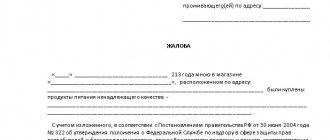Author: Maria Novikova
In almost any work group, friction arises between employees due to a variety of reasons. They can be caused by both industrial and personal circumstances. One way to resolve such conflicts is to file a worker complaint against the employee. In this review, we will tell you how to file a complaint and to whom to file it, what is the time frame for its consideration, and what the violator faces for an offense.
What behavior in the workplace is considered unlawful?
The law does not stipulate what can be classified as inappropriate behavior.
To establish acceptable boundaries, the organization’s management needs to introduce criteria into local regulations. Misconduct often means:
- insults to colleagues and clients;
- use of profanity, including in ordinary speech;
- rude attitude towards strangers;
- obscene gestures;
- refusal to fulfill one's obligations.
The list may be expanded by decision of the organization's management.
Insult
Insult is understood as an employee’s actions towards a third party that degrade honor and dignity. This concept includes the use of obscene expressions and comparisons of a colleague with any objects.
Such violations are committed both by employees among themselves and by management in relation to subordinates.
Boorish behavior
Rudeness is the rudeness and insolent behavior of an employee towards other persons. These actions affect the entire team as a whole, and not individual workers.
A person who displays rudeness makes himself look superior to his colleagues. This behavior is often experienced by those who hide their competence.
Refusal to perform assigned duties
At the moment of signing the employment contract, the employee and the employer are assigned responsibilities. They are regulated by agreement. But employees do not always focus on the document and follow the prescribed rules. If an employee does not fulfill his obligations, as a result of which the labor process suffers, a complaint can be filed against him.
Reference! This behavior is considered a disciplinary offense. Liability may arise within the framework of labor laws and the agreement with the employer.
Manipulation in relationships
Manipulation is the use of another employee's weakness to gain advantage. It can be carried out both between colleagues and by superiors in relation to subordinates. The fact of manipulation is difficult to determine.
This action is not a disciplinary violation. It is only allowed to file a complaint against a person if the complainant has identified the presence of manipulation.
Reasons for writing
Most often, complaints against employees are received in situations where they commit the following offenses:
- treat other employees with disrespect, are rude, show rudeness, use insulting language towards employees, their families, comrades, etc.;
- use obscene language in communication to humiliate other people;
- make threats;
- allow assault;
- treat female employees with disrespect and harass them sexually;
- force other employees to perform duties that they should not do, or this is not provided for in the employment agreement;
- do not comply with labor safety rules at work;
- sabotage the production process;
- do not follow orders from management, engage in arbitrariness;
- are engaged in fraud related to late payment of wages, reduction of their size, non-payment of bonuses (such offenses are committed by the management of the enterprise).
Watch the video. How to write a complaint correctly:
Drawing up and filing a complaint
To convey the fact of what happened to management, it is necessary to file a complaint.
It can be sent either by an employee of the organization or by a client. Not only a citizen against whom unlawful behavior has been committed can complain. The claim can be submitted by any employee present at the time of the conflict.
In addition to the complaint, an act can be drawn up in the presence of the commission. It notes the fact of incorrect behavior of the employee. This measure is especially often used if a person arrives at work in a state of intoxication.
The complaint is made in any form. The addressee is the head of the organization. The document is submitted to him for review. Based on the results of studying the complaint, a decision is made whether or not to apply sanctions to the employee.
What are we talking about?
One of the ways of such influence is a collective complaint.
What is it? At the legislative level, there is no definition of a collective complaint, as well as the procedure for writing it. Based on the general understanding, a collective complaint is an appeal by a part (whole) team against one of the organization’s employees, with a mandatory indication of the reasons for the violation of their rights by the actions or inactions of the employee, as well as with demands for their elimination. There can be many reasons for filing such a complaint, for example:
- a colleague behaves inappropriately, disregarding business etiquette,
- the employee prevents colleagues from doing their work,
- the employee constantly intercepts clients of colleagues, or transfers unimportant, conflicting partners (in sales) to them.
Types of complaints
There are two main types of complaints. The choice depends on who initiates the solution to the issue: one person or a work team.
Individual
An individual complaint is one that is filed by one person. It can be written on behalf of a company employee or client.
The document must contain the personal data of the applicant. Anonymous requests are not accepted.
Collective
Employee misconduct can impact an entire team. In this case, a single complaint is filed.
The collective appeal must contain the signatures of all citizens whose interests and rights were violated. Such complaints are more effective and more often lead to the desired result.
Useful tips
Listen to our advice:
- You shouldn’t deal with rudeness on your own. Write a collective complaint, so you have a greater chance that your appeal will not be ignored;
- Immediately put all your complaints in writing; verbal complaints will lead nowhere. Be sure to provide documentary evidence of the facts stated in the document;
- use as evidence recordings of conversations, documents, eyewitness testimony, recordings from CCTV cameras, etc.;
- try to ensure that you have proof of the complaint. Where you submitted it does not matter;
- Don’t be nervous, present the situation calmly, using a business style.
Sample complaint
When drawing up a complaint, you can use this sample - >>
The document must include the following information:
- Data of the institution, last name, first name, patronymic of the head. He will consider the appeal.
- Information about the author of the document: last name, first name, patronymic, position. When filing a collective complaint, the details of all interested parties are listed.
- Incident data. The date and time when the citizen committed unlawful behavior, as well as the details of the guilty person, are recorded. Violations are indicated in detail.
- Date of filing the complaint.
- Applicant's signature. When registering a collective complaint, the signatures of all employees indicated as complainants are required.
- A list of documents that can be used to support the accusations.
How to write a document correctly
The standard form for writing a complaint has not been approved, so it is drawn up in any form.
In this case, the document must contain certain information:
- The so-called “header” is placed in the upper right corner of the sheet. This part indicates: the full name of the institution where the document is sent, the full name and position of the director, since it is necessary to contact him, and the personal data of the person filing the complaint. If we are talking about a collective appeal, information about the person representing the entire team is specified;
- the name of the document is written in the middle of the sheet - “Complaint”;
- The “body” of the document contains the following information: the full name of the employer, its organizational and legal form, the reason for the application is specified, and the offenses committed by the employee are listed, the date of the violations. In addition, information that is directly related to the current situation is indicated;
- demands are listed - to stop the development of a conflict situation, take legal measures, etc.;
- the appendix lists copies of documents that confirm the facts stated in the complaint;
- Next, the date of the appeal is recorded, and the signatures of the applicant or applicants are affixed (if we are talking about a collective complaint).
Submission methods
There are several ways to file a complaint:
- Personally to the employer's office. There must be two copies of the document. On one, which remains in the applicant’s hands, a mark of acceptance is placed.
- By mail. It is necessary to prepare a registered letter with acknowledgment of delivery and a list of attachments. The notification will serve as confirmation that the letter has been sent.
- Via the official website. Regulatory authorities often have a special section through which requests are accepted. The applicant should receive a letter to his email with information that the claim has been registered and accepted for consideration.
Specifics of the report
This type of official information, unlike other types of notes, is addressed exclusively to higher positions, authorized persons, superiors - that is, people who make real decisions. The information contained in such a note is precisely intended to bring to life some kind of action, which one depends on the purpose of the report and the information and proposals contained in it.
Difference from a memo
The report is intended to convey information “vertically”, and the memo transmits information between employees of equal status. Unlike a report, a memo is not provided for by OKUD. Written by the employee of his own free will.
Difference from an explanatory note
The explanatory note is also sent “vertically”, but is fundamentally different in the purpose stated in the very title of the document: to explain this or that current situation in order to resolve the issue of the employee’s guilt or innocence. That is, as in the report, a representative of a higher position is encouraged to make a decision, but this decision concerns only disciplinary violations. OKUD has its own code, just like the report. Written at the request of management.
NOTE! The memorandum, depending on the circumstances, can be written on one’s own initiative or at the direction of authorized persons. This document has legal force.
Where to file a claim?
At the initial stage, it is necessary to resolve the issue with the employee through the management of the organization. If this does not bring results, you can contact the Labor Inspectorate, the prosecutor's office or the court.
Complaint to management
The employer is responsible for resolving conflicts between employees. If problems arise, the first step is to file a complaint with your manager.
The document is submitted through the secretary. If a citizen applies in writing, he should be given a similar response.
The appeal must describe in detail the fact of boorish behavior and violation of labor regulations. The document must be drawn up in a business style, without obscene language or emotional expressions. The text should not specify requirements or provide measures that must be taken in relation to the employee. Sanctions are determined by the manager himself.
Labour Inspectorate
An appeal to the labor inspectorate is carried out in two cases:
- the employer did not take action against the employee;
- boorish behavior, illegal actions committed by the head of the organization.
After filing a complaint, labor inspectorate specialists initiate an inspection. They must confirm or deny facts of violation of the law.
Attention! There must be evidence of management misconduct. You can attach audio and video recordings, written testimony of witnesses.
Prosecutor's office
If contacting the labor inspectorate does not bring results, you can file a complaint with the prosecutor's office. The agency's employees are verifying these facts. If a citizen is found guilty, he may be held accountable.
Class action in court
If an employee’s incorrect behavior affects the interests of several persons, and management and regulatory authorities fail to act, a class action lawsuit may be filed in court.
The document is drawn up in accordance with the requirements of Articles 131 and 132 of the Code of Civil Procedure of the Russian Federation. It must describe in detail the essence of what happened, as well as support the facts of the offenses with evidence. These include audio, video recordings, and witness statements.
If you go to court, you can receive compensation, including moral damages. After considering the case, the judge makes a decision in favor of the plaintiff or refuses to satisfy the claims.
Basic Concepts
For such cases, jurisprudence provides for the possibility of writing a complaint against a specific person. After sending it, management and the relevant authorities will be obliged to take all necessary measures, and at the same time punish the culprit and provide a written response in favor of the applicant.
Complaints about specific employees are not just statements. To prepare and submit them, you must carefully prepare by collecting facts about your colleague’s behavior that does not comply with the norms. Claims can be individual or collective.
Acceptable time limits for responding to a complaint
To determine the period within which a response to a complaint must be received, it is necessary to focus on the filing date.
The countdown begins from the moment the document is registered. The employer's response time may be regulated by a collective agreement. The applicant also has the right to independently indicate a reasonable period for consideration of the application. Usually it is 7-10 days.
When applying to government agencies, the review period is regulated by law. It is 30 days from the date of acceptance of the complaint. Claims are reviewed within 5 days.
Claim against an employee in the trade and consumer services sector
There are frequent cases of rudeness from sellers, waiters, and security guards. The method of response is determined by the mood of the person writing the complaint. Possible goals:
- constructive – avoid paying for low-quality goods/services;
- personal - to punish the offender.
Sample complaint against the seller to Rospotrebnadzor
16.8 KiB 232 Downloads Details
| Date of: | 25.05.2017 |
Example. The cafe visitor was brought diluted juice and stale salad. The order must be canceled. If there is no understanding on the part of the waiter or the manager he hired, it is worth threatening to file a complaint with Rospotrebnadzor, the State Sanitary and Epidemiological Service, and the State Fire Service. After this, the administration usually does not insist on payment.
When the complainant's goal is to express outrage and seek punishment, it is advisable to:
- write a remark in the complaint book;
- notify the individual entrepreneur or the administration of the enterprise.
Calling the owner is an effective remedy. According to the laws of business, the client is “always right” and “votes with his ruble.” The culprit will most likely be punished disciplinaryly or financially. It is worth paying attention to the “Consumer Corner”. A copy of the SPD registration certificate is posted here, a sample of which contains a contact phone number. A book of complaints is also kept here. But according to modern legislation:
- only those who are subject to the RF Regulation dated January 19, 1998 No. 55 are required to start it;
- sample document is not installed.
A book is trustworthy if it is numbered and bound, and the place where it is bound is sealed and signed. If this is the case, you should write a detailed negative review. You need to sign under it, indicate your full name (if you don’t want to, at least your first and patronymic), a contact phone number for feedback and the current date.
Read also: Mass dismissal of workers - criteria and other features
Questions from our readers
What penalties can be applied?
After consideration of the complaint, various penalties may be applied to the guilty employee. They are determined by the norms of the law (Articles 192 and 193 of the Labor Code of the Russian Federation). Also, the employer has the right to independently determine measures of influence on employees, indicating them in the employment or collective agreement. It is important that the employee is familiar with the rules, as evidenced by his signature.
| Penalties | A comment |
| Note from management | Announced orally |
| Rebuke | Announced after the relevant order is issued |
| Termination of an employment contract | Possible in case of gross violations of the agreement |
In order to apply disciplinary measures, established rules must be followed. The employee must write an explanatory note in which he explains his actions. But even if he refuses to explain the essence of what happened, dismissal is possible.
A citizen may also be deprived of his bonus. This is provided if the employee does not fulfill the requirements of the employment contract.
Is it possible to fire an employee for rudeness?
An employer has the right to fire an employee for rudeness. Standards of conduct, as well as consequences for ignoring them, are described in the labor instructions, contract, and internal rules. An employee who violates the rules may be fired.
The fact of insult or rudeness must be recorded in a special act. The basis for its execution is a memorandum or complaint.
Dismissal immediately is practically not applied. The employee is given a verbal warning. If this behavior occurs again, disciplinary action may be taken, up to and including termination.
An employee can be fired if there are three violations. They do not necessarily have to be associated with a boorish attitude.
Possible liability
Quite often you can find boors not only among ordinary workers, but also among immediate superiors. This could be the head of the department, foreman, foreman, etc.
There is a not very pleasant trend: the higher the boss is, the more unpleasant actions he can afford. To put up with such behavior means to stop respecting yourself. Not every person likes to complain, but this is not the case. You must always defend your honor and dignity.
Important! If the complaint is reviewed and they agree that decisive action needs to be taken, the following penalties will most likely be used:
- will issue a verbal reprimand and promise further consequences;
- they will issue a reprimand “with entry into your personal file”;
- bonus payments will be deprived. By the way, many employees consider this punishment more serious than a reprimand;
- will be removed from their position;
- they will fire you from your job and make a not very pleasant entry in your work book. Although often in this case they write “dismissed at his own request.”
Sometimes people don’t even imagine what can be achieved with their boorish behavior in the workplace. For such actions, the employee faces:
- civil liability. In this case, he will have to compensate for moral damage. The injured employee, according to paragraph 1 of Art. 152 of the Civil Code of the Russian Federation, may go to court in order to protect his reputation. According to clause 3.7 of Art. 152 the offender will have to make a public apology. In addition, monetary compensation for moral damage is possible (Article 150 and Article 151 of the Civil Code of the Russian Federation);
- criminal liability. Penalty measures in this case are provided for in Art. 130 of the Civil Code of the Russian Federation “Insult”;
- administrative responsibility. It is regulated by clause 5 of Art. 5.61 and is called “Insult”.
Please note! Sometimes people don't see the difference between slander and insult. But in fact, these are completely different concepts, and such acts are punished differently.
There is a fine for inappropriate treatment of employees. Such punishment can be incurred by both individuals and legal entities (Article 5.61 of the Code of Administrative Offenses of the Russian Federation).
The size of the fine depends on the category to which the perpetrator belongs:
- ordinary employee - from 1000 to 5000 rubles;
- executives - from 10,000 to 50,000 rubles.
The amount of the fine depends on the specific situation and is determined by the court.
Many have encountered situations where the boss and the boorish employee are relatives or friends. Most likely, their behavior is explained by a feeling of permissiveness. Often in groups, a person who is unpleasant in all respects gets “turned on.” It is clear that filing a complaint with management is useless.









